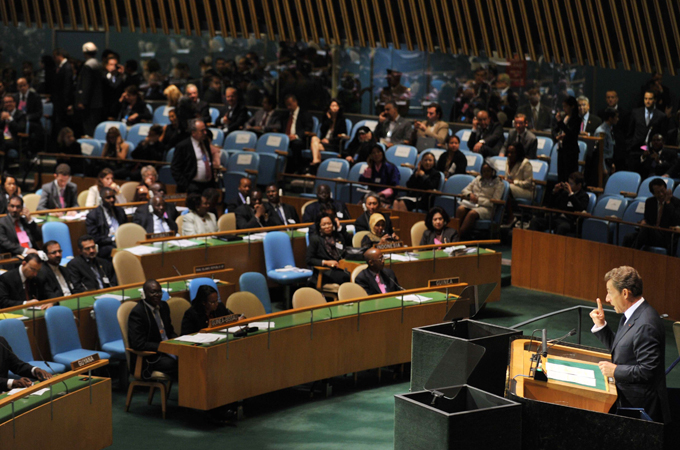Iran under spotlight at UN summit
Tehran’s nuclear programme likely to come to the fore as Mahmoud Ahmadinejad prepares to deliver address on development.

 |
| The UN General Assembly is discussing the Millennium Development Goals for poverty reduction [AFP] |
US authorities have beefed up security in New York in view of the Iranian president’s visit to the city to address the UN General Assembly which is discussing the Millennium Development Goals for global poverty reduction.
Concrete blocks and security guards lined the street across from Mahmoud Ahmadinejad’s hotel prior to his address on Tuesday, as protesters chanted slogans against the leader of the Islamic Republic.
Officially, Ahmadinejad is scheduled to speak about development, as world leaders are discussing progress on poverty alleviation, but Iran’s human rights record and controversial nuclear programme are likely lead the unofficial agenda surrounding his visit.
Ahmadinejad, who arrived in New York on Saturday, told the Associated Press news agency that “the future belongs to Iran” and challenged the US to accept that his country has a major role in world affairs.
US officials have made it clear there are no plans for Barack Obama, the US president, to have any contact with the Iranian leader in New York this week.
Walkout expected
Western ambassadors are expected to walk out of Ahmadinejad’s UN speech. “It has become a tradition. It is a question of who walks first,” one western diplomat told the AFP news agency, speaking on condition of anonymity.
The New York Post, a right-wing tabloid, criticised US government spending on security preparations surrounding the Iranian leader’s visit.
|
Iran’s nuclear programme is expected to dominate unofficial discussions in New York |
“Ahmadinejad has access to a private elevator on his floor, a source said, and everything he touches is supplied by his aides. His rooms’ windowpanes were swapped for bullet-proof glass,” The Post reported.
On the topic of Iran’s nuclear programme, which Ahmadinejad claims is intended for power generation rather than bomb making, Obama plans to empathise that the “door is still open” for international engagement, a US security official said on Monday.
Al Jazeera’s Zeina Awad said on Tuesday that international diplomats are closely watching Ahmadinejad’s actions in New York because “any developments could have long term repercussions” for a nuclear deal.
While Ahmadinejad stole the spotlight, world leaders discussed the best ways to reduce global poverty.
Poverty reduction plans
Ban Ki-moon, the UN secretary-general, opened the annual summit on Monday with a plea to presidents, prime ministers and kings to use their power to meet UN goals to help the world’s poorest by 2015.
Ten years after world leaders set the most ambitious goals ever to tackle global poverty, meeting the deadline will be difficult, if not impossible in some cases, the UN says.
On Monday, Nicolas Sarkozy, France’s president, made an impassioned plea to developed countries to join his country in raising its contribution to meet the millennium goals. France, he said, would increase its contribution by 20 per cent over the next three years
Mary Robinson, the former president of Ireland who was the UN human rights commissioner when the millennium goals were set in 2000, told Al Jazeera that there were two key reasons for why the UN has fallen short of its goals.
The first, she said, was the lack of a “rounded” approach to human rights, taking into account women’s reproductive and legal rights and issues. The other is that the policies are not linked to employment, and do not address the jobless rates in the Middle East and North Africa.
She also conceded that there was an issue of accountability.
“The Millennium Development Goals did not have a sufficient benchmarking and accountability, including more accountability of the rich countries,” Robinson said.
Ten African countries, including Ethiopia, Egypt, and post-conflict Angola, have halved their absolute poverty levels, Benin ranked in the top 10 in education improvements, and Angola and Niger significantly reduced child deaths.
On the minus side, Amnesty International said efforts in many countries fail to address the widespread discrimination women face in accessing food, water, sanitation and housing – especially in slums. It accused Kenya of ignoring the needs of women living in slums and Nigeria of evicting slum dwellers and driving them deeper into poverty.